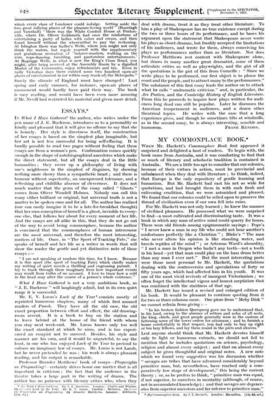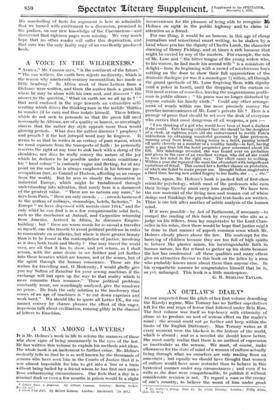MY COMMONPLACE BOOK.*
WHEN Mr. Hackett's Commonplace Book first appeared it surprised and delighted a host of readers. To begin with, the book came from Australia, and it was comforting to find that so much of literary and scholastic tradition is contained in Australia. • We are a little too apt to consider that our colonies, because of their virtues in action, must be provincial and unbalanced when they deal with literature ; to think, indeed,
that Europe is the only repository of gentle learning and humanism. But Mr. Hackett had cast his net so wide for quotations, and had brought them in with such fresh and enlivening erudition, that we were astonished and pleased.
We found that our colonies could be relied upon to preserve the thread of civilization even if our own fell into ruins.
For Mr. Hackett was not only learned ; he knew the manner of civilized pleasures. He possessed what we were surprised to find—a most cultivated and discriminating taste. It was a book in which any man of active mind could quarry for hours.
There were old friends among epigrammatic sayings : Pope's " I never knew a man in my life who could not bear another's misfortunes perfectly like a Christian " ; Blake's " The man who never alters his opinion is like standing water, and breeds reptiles of the mind " ; or Artemus Ward's absurdity, " I met a man in Oregon who hadn't any teeth—not a tooth in his head—yet that man could play on the bass drum better than any man I ever met." But the most interesting parts were those most personal to Mr. Hackett, the quotations dealing with the controversies and speculations of forty or fifty years ago, which had affected him in his youth. It was one of the most vivid revivals of insurgent Victorianism ; we often forget the intellectual vigour and honest scepticism that was combined with the staidness of that age.
Mr. Hackett has issued a revised and enlarged edition of his book. It would be pleasant to continue quoting from it for two or three columns more. One piece from " Moby Dick " we cannot refrain from giving :- " In his broken fashion Queequeeg gave me to understand that, in his land, owing to the absence of settees and sofas of all sorts, the king, chiefs, and great people generally were in the custom of fattening some of the lower orders for ottomans ; and to furnish a house comfortably in that respect, you had only to buy up eight or ten lazy fellows, and lay them round in the piers and alcoves."
Lest anyone should think that Mr. Hackett devotes himself only to light or humorous extracts, we should not fail to mention that he includes quotations on science, psychology, religion and almost every subject ; and that on almost every subject he gives thoughtful and original notes. A new note which we found very suggestive was his discussion whether " savages are tribes that have advanced considerably beyond primitive man, but, nevertheless, have reached only a com- paratively low stage of development," this being the current theory ; or, as he prefers to think, " primitive man was equal, if not superior, to ourselves in mentality (although, of course, not in accumulated knowledge) ; and that savages are degener- ates from superior ancestors and far inferior to primitive man."
• My Commonplace Book. By J. T. Hackett, London : Macmillan. [12a. 6d, net.]
his marshalling of facts for argument is here so admirable that we turned with excitement to a discussion, promised in the preface, on our new knowledge of the Unconscious—and discovered that eighteen pages were missing. We very much hope that no other reader will suffer this deprivation, and that ours was the only faulty copy of an excellently produced book.



























































 Previous page
Previous page